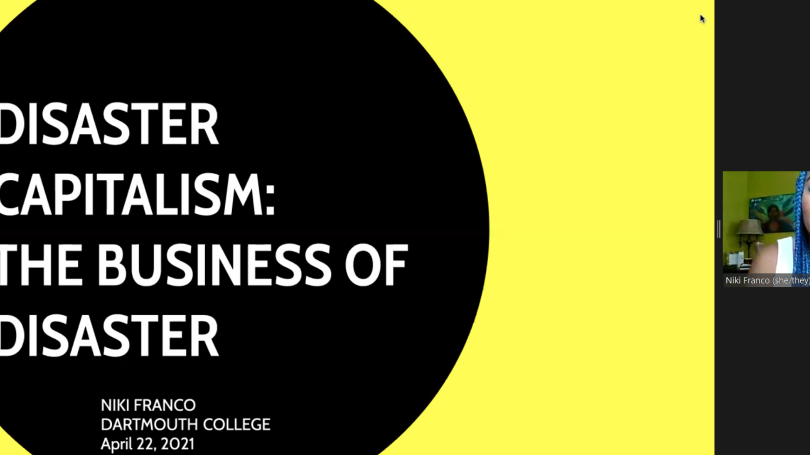
- Public Policy
- Leadership
- Funding
- News & Events
- About the Center
Back to Top Nav
Back to Top Nav
Back to Top Nav
Back to Top Nav
The Dartmouth Student Union and the Afro-American Society commemorated Earth Day by organizing a teach-in with community organizer and cultural worker Niki Franco. Niki talked to us about “disaster capitalism” or the business of disaster, defining it as the phenomenon of using a situation of crisis to pursue monetary gain by making large-scale changes that may be otherwise opposed. She traced the concept back to the colonization of the Americas and related it to Naomi Klein’s concept of the “shock doctrine,” explaining it through example case-studies of Hurricane Katrina in New Orleans, Hurricane Maria in Puerto Rico, and sea-level rise in Miami.
Hosting this teach-in on Zoom on Earth Day, the broadly defined category of disaster including environmental disasters, but also pandemics and wars, formed a very pertinent structure to orient discussion around. Through case-studies, Niki emphasized how cities were doing very little to protect their residents against disaster, investing instead in militarization and tax-breaks for the wealthy, while also standing ready to implement privatization and other unpopular “reforms” during a period of crisis.
Talking about Earth Day, Niki discussed how it had become a depoliticized holiday, devoid of any content geared towards understanding our relationship with the environment. She discussed also the conception of “nature” that inevitably appears in Earth Day Instagram posts—a pristine, uninhabited landscape just lying there for consumption. The relationship of that pristine conception of nature, the idea of nature conservation by possession, and the ongoing climate crisis was linked to the colonial mindset of land as property. Niki said that there can be no environmental politics that does not center Indigenous sovereignty. She related that to how an individualized, apolitical environmentalism refuses to engage with the militarized class-system that is the actual largest contributor to the climate crisis. She talked to us about her own experience with organizing, stressing that we had entire lineages of resistance and political struggles behind us, and that temporary setbacks were no reason to give up on the broader crusade against disaster capitalism.
Apart from that, Niki also helped us chart out further avenues for political struggle, focusing specifically on the unique terrain college students operate on. She answered questions about ethical engagement, hopeful futures, cross-class coalition-building, ongoing struggles against austerity and privatization, and how to keep organizing after college. In her answers, she tried to bridge the gaps between Dartmouth students and Upper Valley residents, between short-term tactics and long-term strategy, between official non-profits and unofficial mutual aid funds, and between theory and practice. Niki Franco’s teach-in was illuminating not only in its theoretical explanation of “disaster capitalism” and the case-studies showcasing the connections between neoliberalism and crisis, but also in highlighting the many forms of collective struggle happening around us to protect the world from the worst of the climate crisis.
Writtn by Dev Punaini '22